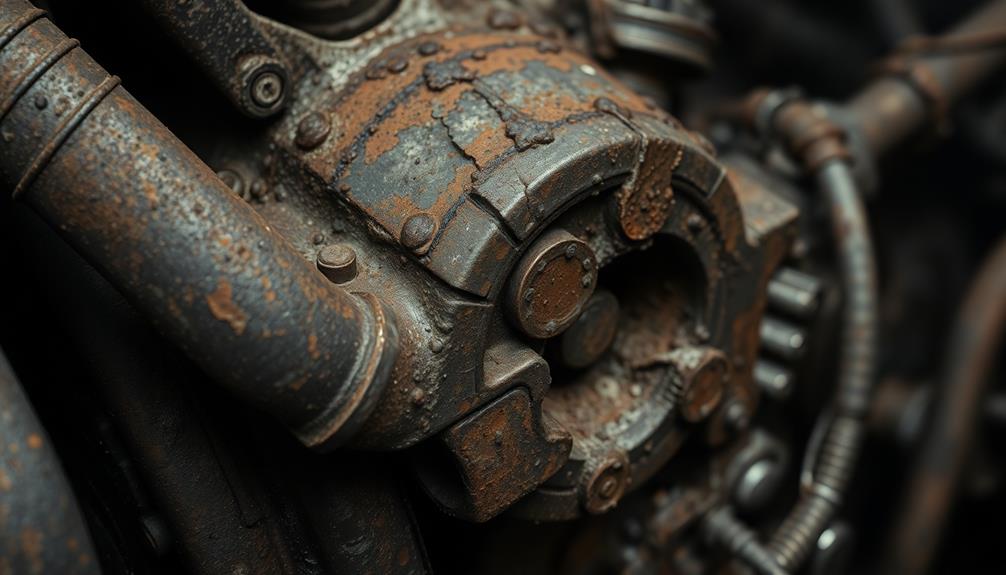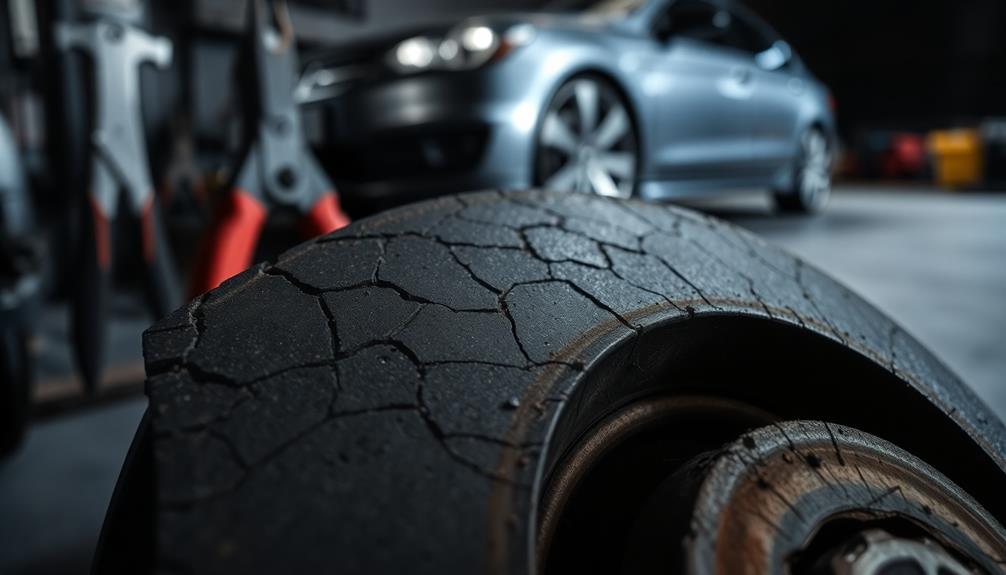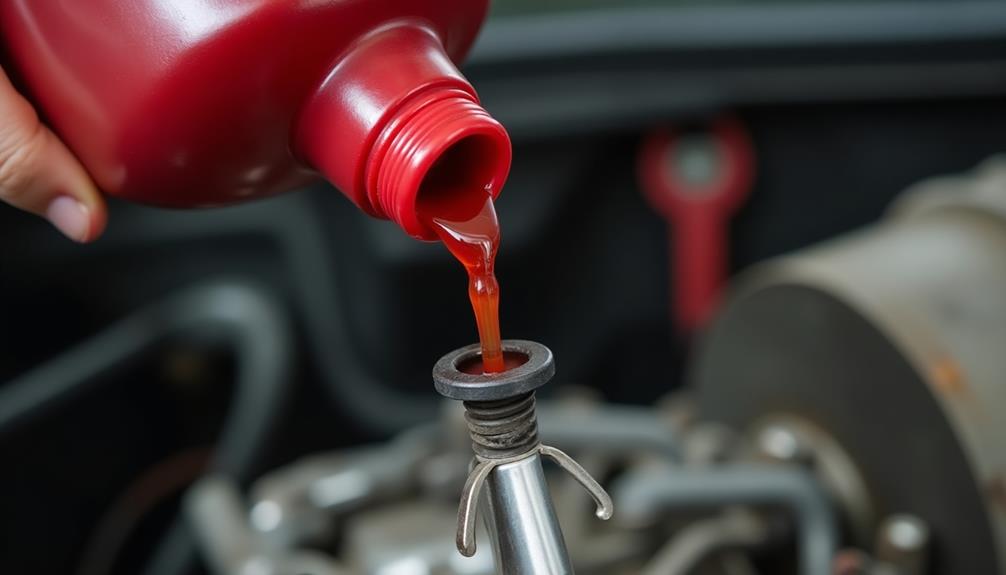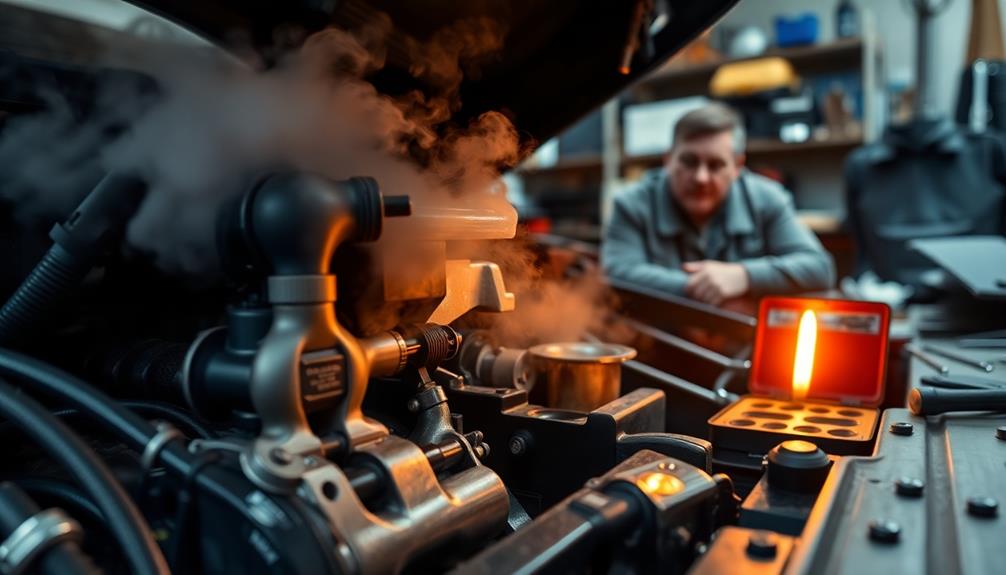The one part that's secretly destroying your engine from the inside is the engine oil. If you ignore oil maintenance, you risk low oil levels, which can lead to severe friction and catastrophic engine failure. Even overfilling can cause problems like hydro lock, which damages essential components. You may think a little extra oil is harmless, but it can create foaming and increase the overheating risk. To keep your engine running smoothly, regular checks and awareness of oil capacity are vital. Stick around, and you'll uncover more tips to safeguard your engine's health.
Key Takeaways
- Insufficient engine oil leads to inadequate lubrication, causing metal-on-metal contact and severe damage.
- Overfilling oil can cause hydro lock, damaging engine components due to liquid infiltration.
- Low oil levels increase friction and overheating, risking catastrophic engine failure.
- Oil foaming from excess levels compromises lubrication, leading to overheating and potential engine damage.
- Neglecting regular oil checks can result in hidden issues that severely impact engine performance.
Understanding Engine Oil Importance
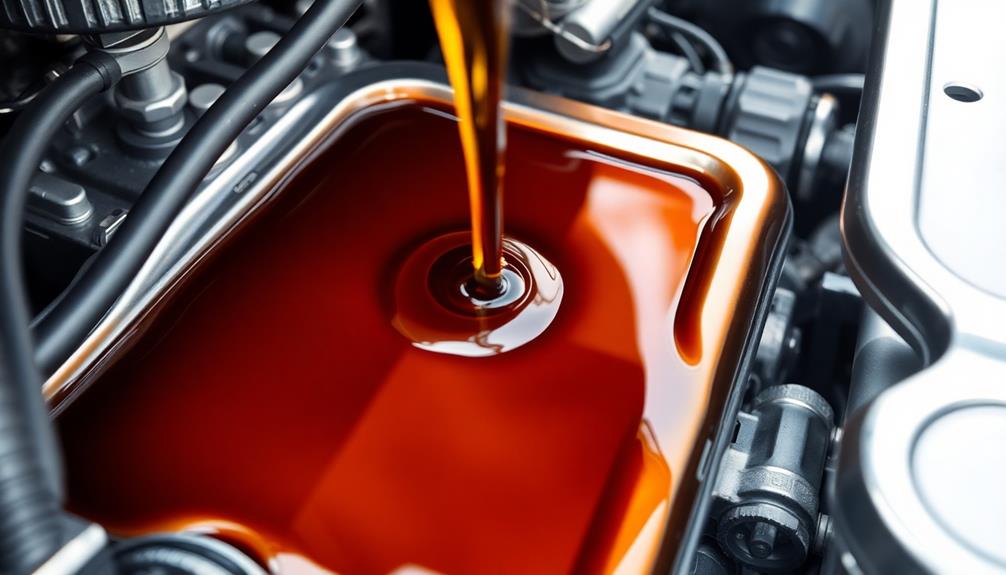
When it comes to your engine's health, understanding the importance of engine oil is critical. Engine oil plays a key role in lubricating moving parts, preventing metal-on-metal contact that can lead to severe damage and overheating.
To maintain your engine's performance, you need to regularly check your oil levels. Insufficient oil can compromise your engine's longevity and lead to significant component failure, while excess oil can disrupt lubrication due to foaming, causing inadequate oil pump functionality.
It's essential to know that most modern engines can tolerate slight overfilling, but significant overfilling poses serious risks. Hydro lock, for example, can occur when there's too much oil because oil can't compress, leading to bent piston rods or damaged cylinder heads.
Effects of Low Oil Levels
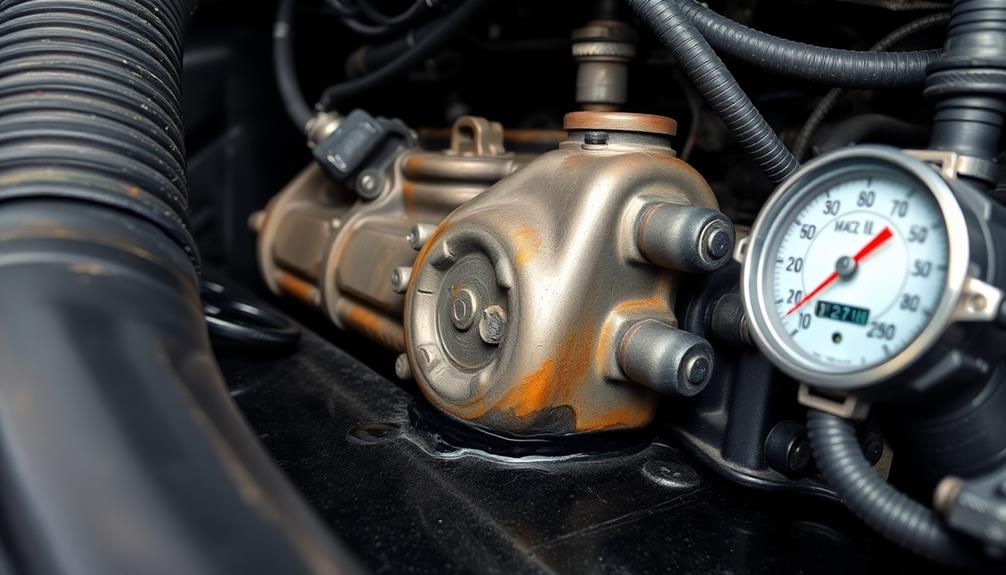
Low oil levels can wreak havoc on your engine's performance and longevity. When your oil levels drop, it prevents proper lubrication of moving metal parts, which increases friction. This friction can lead to catastrophic engine failure.
Vital components like bearings and pistons rely on adequate oil to function correctly; without it, they can overheat and fail, greatly reducing your engine's lifespan.
It's essential to make sure you regularly check your oil levels. Ignoring oil pressure warning lights might result in irreversible damage, leaving you with costly repairs.
Low oil levels also compromise your engine's cooling system, causing excessive heat buildup that damages internal components.
Engine longevity is markedly threatened when oil levels fall below the recommended capacity. You should make sure to prioritize routine maintenance to keep your engine running smoothly.
Regular oil changes and checks can save you from the devastating effects of low oil. Keep an eye on your oil levels, and don't take chances with your engine's health.
Consequences of Excess Oil

Excess oil in your engine can cause serious problems, often leading to mechanical failures that could have been easily avoided.
When you overfill your engine with oil, the crankshaft can hit the oil in the pan, which poses a significant risk of mechanical failure. If you push your engine to high RPMs with too much oil, it can lead to oil foaming. This foamy oil disrupts lubrication, hurting engine components and reducing the oil pump's functionality.
Inadequate lubrication increases the risk of overheating, making engine failure more likely. Additionally, the increased pressure from excess oil may blow engine seals, resulting in oil leaks that lead to costly repairs.
It's vital to remember that modern engines have specific limits on how much extra oil they can tolerate. Overfilling by just one quart or more can spark serious issues.
To keep your engine running smoothly, always check the oil level and verify it stays within the recommended range. Taking these precautions can save you from expensive repairs and keep your vehicle in top shape.
Risks of Hydro Lock
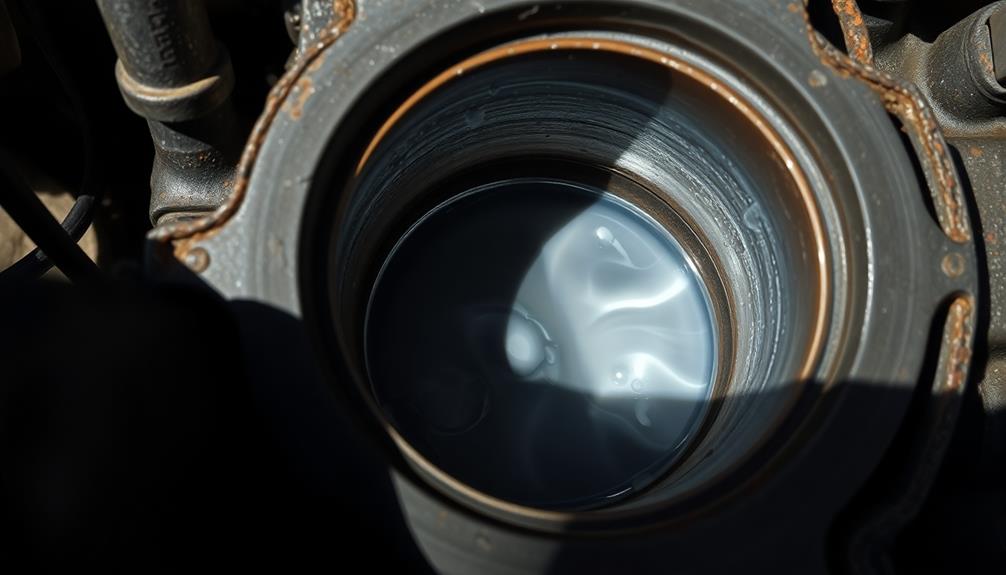
Hydro lock poses a serious threat to your engine's health, arising when liquid, like water or oil, infiltrates the engine cylinders. This situation prevents the pistons from moving properly, leading to dangerous consequences. Unlike air or gasoline vapors, liquids can't be compressed. As pressure builds, it can bend piston rods or damage cylinder heads, resulting in severe mechanical failure.
One of the most common causes of hydro lock is driving through deep water or flood conditions. When you encounter such scenarios, water can easily be sucked into the engine, putting it at serious risk.
If you don't address hydro lock promptly, you could face broken components and costly repairs that could have been avoided.
To protect your engine from hydro lock, regular maintenance and checks of fluid levels are essential. By staying vigilant and addressing potential issues early, you can guarantee your engine remains in good condition.
Modern Engine Design Considerations

Many drivers mightn't realize how vital modern engine design considerations are for maintaining best performance. One major factor is oil capacity. Most modern engines can handle slight overfilling—up to half a quart—without immediate issues. However, significant overfilling, defined as one quart or more, can lead to serious risks for your engine's health and performance.
Modern engine designs have some extra space for oil, but every engine has its limits that shouldn't be exceeded. Misreading dipsticks or using the wrong ones are common causes of overfilling, and these mistakes can result in severe engine damage.
To prevent these issues, you must regularly check your oil level and understand the specific oil capacity recommended for your vehicle. Regular maintenance becomes essential in ensuring your engine functions properly and efficiently.
Awareness of these design considerations not only helps you avoid common pitfalls but also prolongs your engine's lifespan. Remember, taking the time to properly maintain your engine can save you from costly repairs down the road.
Best Practices for Oil Maintenance
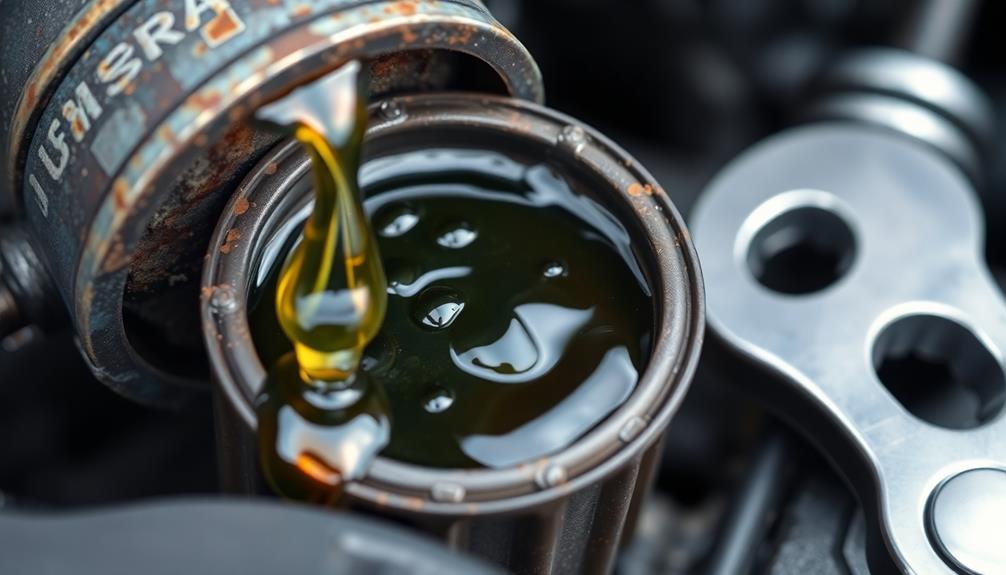
Proper oil maintenance is essential for keeping your engine in top shape and preventing costly repairs. Start by regularly checking the oil in your engine on a flat, level surface to guarantee accurate readings.
It's best to perform these checks when the engine is cold; this way, you get a precise measurement without misinterpretation. Always use the manufacturer's designated dipstick for your oil level checks. Using the wrong dipstick can lead to severe engine damage.
If you find excess oil in your engine, drain it using a clean pan or vacuum pump to restore the oil level to the manufacturer's recommended capacity. Keep yourself informed about the specific oil capacity recommended for your vehicle.
This knowledge helps you avoid both underfilling and overfilling, which can adversely affect engine performance and longevity. By staying proactive about oil maintenance, you'll guarantee that the oil in your engine contributes to peak performance instead of becoming a hidden threat.
Implement these best practices regularly, and you'll considerably extend your engine's lifespan while enjoying a smoother ride.
Common Misconceptions About Oil
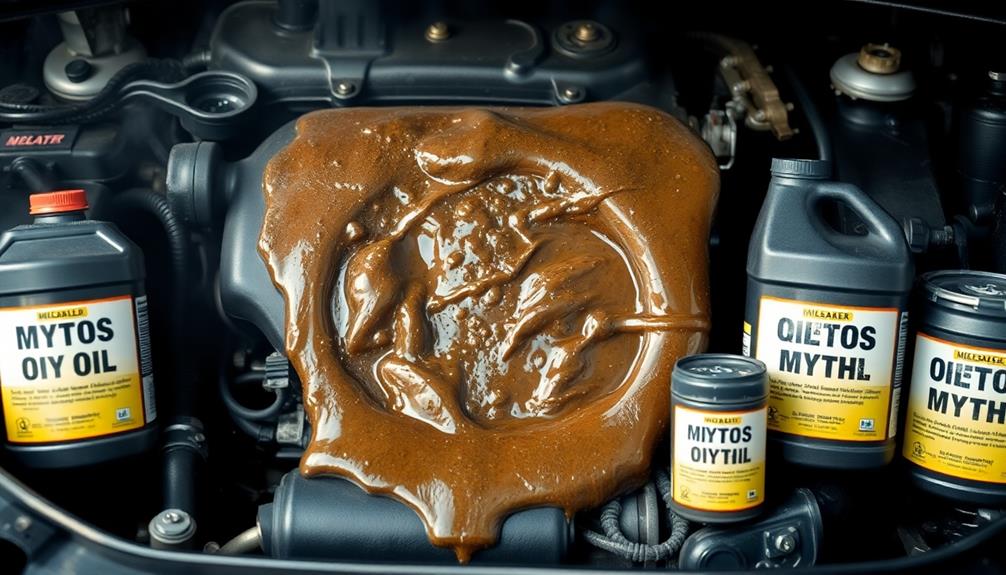
You might think that adding more oil is always a good idea, but overfilling can actually harm your engine.
Checking your oil levels regularly is essential, and it's best done when the engine is cold for an accurate reading.
Ignoring these simple practices can lead to serious consequences for your car's performance and longevity.
Overfilling Oil Risks
Overfilling engine oil is a common pitfall that can lead to serious mechanical issues. Many car owners underestimate the risks involved, but ignoring the oil level can have dire consequences.
Here are the main overfilling oil risks you should be aware of:
- Crankshaft Damage: Excess oil can cause the crankshaft to hit the oil in the pan, resulting in increased pressure and mechanical failure.
- Foaming Oil: At high RPMs, extra oil can foam, reducing lubrication effectiveness. This can damage vital engine components and lead to costly repairs.
- Hydro Lock: If you overfill by a quart or more, you risk hydro lock, where oil can't compress, leading to catastrophic damage to piston rods and cylinder heads.
While modern engines can tolerate slight overfilling (up to half a quart), it's essential to check oil levels accurately.
Using the wrong dipstick can lead to miscalculations, further exacerbating overfilling oil risks. To keep your engine running smoothly, always confirm you're within the recommended oil level range.
Low Oil Consequences
Low oil levels can be deceptively harmful, often leading to severe engine damage that car owners mightn't immediately recognize. When oil levels drop, your engine parts lack proper lubrication, which results in metal-on-metal contact. This friction can cause vital components to overheat and eventually fail, severely compromising your engine's longevity and performance.
Ignoring oil pressure warning lights is a mistake that can lead to irreversible damage. If that light comes on, it's important to shut down your engine immediately. Continuing to drive can exacerbate the problem, increasing repair costs and potential engine replacement.
Moreover, low oil levels can hinder your engine's cooling system, raising the risk of overheating. When oil can't circulate effectively, hot spots develop within the engine, leading to catastrophic failures.
Regular oil checks are essential; neglecting this simple maintenance task can spiral into costly repairs down the line.
Importance of Regular Checks
Regular checks on your engine oil are essential to maintaining its health, yet many drivers overlook this important task. Failing to monitor the oil in the engine can lead to severe issues, including irreversible damage and costly repairs.
Just as with cold medications overview, understanding the importance of regular checks is imperative for overall performance. Here are three common misconceptions that could harm your engine:
- Oil Doesn't Need Regular Checks: Many believe once they change the oil, it's good for a while. However, insufficient oil levels can cause lack of lubrication and overheating, risking engine failure.
- Oil Pressure Warning Light is Just a Suggestion: Ignoring this warning can lead to catastrophic consequences. It's a signal that you need to check the oil immediately.
- Any Flat Surface is Good for Checking Oil: Always check the oil in your engine on a flat, level surface. An incline can result in incorrect readings, leading to miscalculations regarding oil levels.
Using the correct dipstick and being aware of your engine's recommended oil capacity are important steps in ensuring longevity.
Don't treat oil in the engine as a "set it and forget it" component; regular maintenance is key!
Signs Your Engine Needs Attention
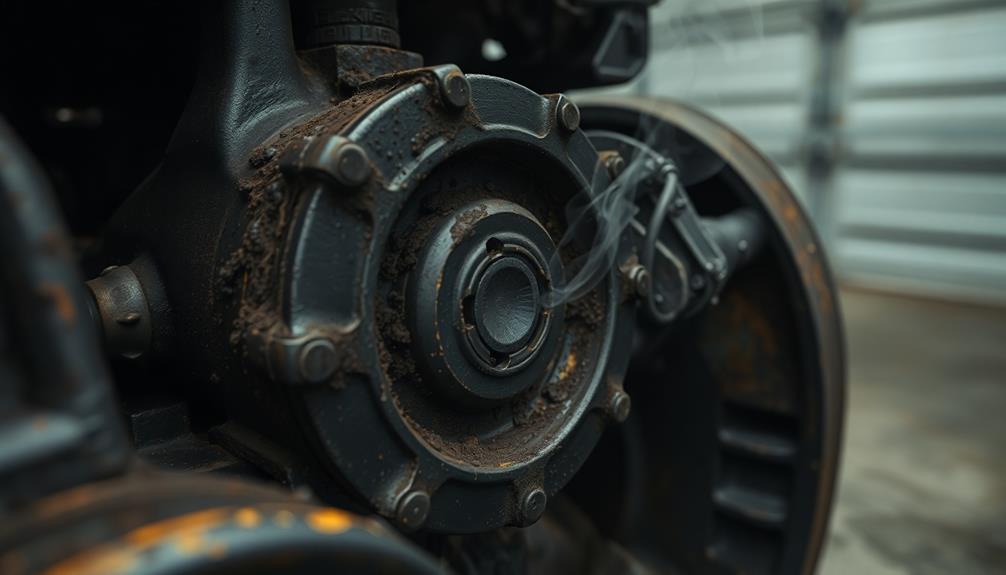
Your engine can send you clear signals when it needs attention, and recognizing these signs early can save you from costly repairs. One major indicator is low engine oil levels. Insufficient lubrication can lead to severe engine damage due to overheating and metal-on-metal contact.
If you hear unusual noises coming from the engine or see a warning light on your dashboard, it's time to check your oil immediately.
Another critical sign is an overheating engine. If your temperature gauge is in the red, you must act quickly to prevent warping metal components and further damage.
Additionally, keep an eye on your timing belt. If it's broken in interference engines, pistons can strike open valves, causing significant engine damage.
Lastly, be aware of hydrolocking, which occurs when excess water or oil prevents the pistons from compressing properly. This can lead to mechanical failure and serious damage.
Frequently Asked Questions
What Happens if You Put Sugar in Engine Oil?
If you put sugar in engine oil, it creates sludge that clogs oil passages, leading to poor lubrication. Increased friction and heat can cause overheating, damaging your engine and potentially resulting in costly repairs or replacement.
What Are the Engine Inside Parts Called?
The engine's inside parts include the cylinder block, crankshaft, cylinder head, pistons, camshaft, timing belt or chain, and oil pump. Each component plays an essential role in ensuring your engine runs smoothly and efficiently.
What Is an Engine That Burns Fuel Inside the Engine?
An engine that burns fuel inside is called an internal combustion engine. It mixes fuel and air, ignites the mixture, and produces power through pressure, driving the pistons and powering your vehicle effectively.
What Does Sodium Silicate Do to an Engine?
Think of sodium silicate as a sneaky thief in your engine. It clogs oil passages, forms sludge, and can lead to overheating. Over time, it damages seals, gaskets, and critical parts, risking catastrophic failure.
Conclusion
In summary, keeping your engine oil at the right level is vital for your vehicle's health. Did you know that nearly 80% of engine failures are linked to oil-related issues? It's a stark reminder that neglecting oil maintenance can lead to serious problems down the line. By regularly checking your oil and following best practices, you can keep your engine running smoothly and avoid costly repairs. Don't let that one part secretly destroy your engine from the inside!
